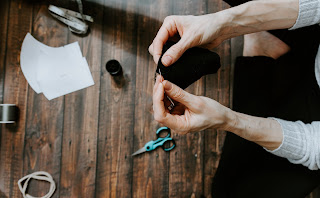Sustainable fashion has a lot to do with frugality, and frugal consumption choices. While the two concepts are far from always being related, they certainly share several similarities – and recognizing these can make it easier for the consumer to frugalize their consumption habits in the realm of fashion. Knowing about sustainable alternatives to fast fashion can be a great help to decrease your resource use, shop less, and overall adopting a more frugal lifestyle.
The first thing to keep an eye out for in the sustainable fashion world is so-called “greenwashing”. Greenwashing is a relatively recent term, describing a tendency of companies to market products and services as more sustainable than they really are. This is an, unfortunately, increasing trend, brought about by an ever-growing environmental pressure from consumers. Non-sustainable companies want to cater to as many consumers as possible, and therefore try to give the impression that they take the climate emergency seriously by greenwashing their non-sustainable products. Typical greenwashing techniques are: the use of green, brown, or plant-focused imagery on products to create an illusion of sustainably sourced materials. Click-baiting online by stating false or only partially true information such as “100% organic” in order to push sales. Or flashing irrelevant claims, such as advertising heavily for the fact that a product is “CFC free” when in fact CFCs have been outlawed for many years already.
Greenwashing is also rampant in the fashion industry, and rule number one for anyone looking to make their consumption more sustainable is to research brands thoroughly and avoid falling for false or pointless claims. What characterizes good alternatives for fast fashion, or so-called slow fashion, is for example the use of high quality, durable material such as linen or wool, timeless rather than hyper-trendy cuts and silhouettes, and locally sourced, produced, and sold products. There are several factors to keep in mind when trying to shop sustainably, such as the carbon footprint of shipping and transport, the socio-economic impact of your purchase, and the value you put on the piece yourself, but the amount of resources used to produce the clothing is always a good start on the journey toward frugalising your wardrobe.
Below you will find a few examples of
sustainable and/or ethical fashion brands to consider for next time you need
something new. But first of all – if you live in The Hague or in the
surrounding area, you need to take a look at the website Sustainable The Hague.
It is an amazing overview of all the sustainable shops, fashion stores,
restaurants, NGOs, companies, and activities available in The Hague, with short
descriptions of their environmental impact and goals.
Furthermore, if you are based in the Netherlands and wish to support Dutch sustainable fashion brands, you can check out the following (there is no shortage of options, this is just a small selection):
If you want to stay up to date on sustainable fashion brands from across the globe, get useful tips for how to sell your clothes online, and read useful breakdowns of sustainable materials and alternatives, check out Good On You. The website offers the world's most comprehensive rating of fashion brands, to make the search for sustainable options a lot easier for the consumer. They even have an ethical fashion app tailored for the sustainability-conscious (or curious) consumer.
It is not easy to be perfect when it comes to sustainability and frugality, especially in a world where (over) consumption seems unavoidable and all-encompassing. This simple overview is meant as a help along the way, to make it a little easier to make sustainable choices when you want to express yourself and your needs through clothing. I hope it helps, and wish you good luck on your journey!
All images are from Unsplash.com


